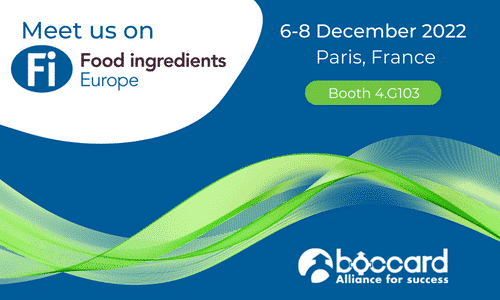Achieving sustainable production is one of the main challenges faced by the food industry.Reducing energy and water consumption or optimizing processes are at the heart of the concerns of manufacturers and their suppliers. Reducing the volume of non–processed products is also one of the many ways to decrease the carbon footprint of food processing plants. One of the solutions, implemented by Boccard’s teams in collaboration with their customers, is residues re-utilization. Also referred to as “ food upcycling “.
What is “Food Upcycling” ?
Well-known in the fashion and interior design industries, the term “upcycling” is the process of reusing or recycling discarded objects or materialto create new products that are marketable with a higher value for the consumer. The term “Food Upcycling” has recently been crafted and used in the food industry.
“Upcycled foods use ingredients that would not otherwise be destined for consumption or market, are purchased and produced using verifiable supply chains and have a positive impact on the environment. “This is the formal definition written by a team of experts from Harvard Law School, Drexel University, The World Wildlife Fund, The Natural Resources Defense Council, The ReFED.
Some by-products generated during the transformation of a raw material into food can indeed be industrialized and thus reused instead of being thrown away. They can have a nutritional or medicinal/curative value and be transformed into food, cosmetic or health ingredients.
This practice has a positive impact on the environment while being beneficial for the industry and the circular economy.
How does Boccard participate in this trend ?
For our customers specialized in ingredients production, Boccard designs, manufactures, installs and maintains fully automated food processing plants. These facilities integrate various technical processes that require the highest standards of safety and quality.
Experts in process engineering and project management, Boccard’s teams have been working for several years with food manufacturers to recycle their unused products production.
Some examples of the many different “Food Upcycling“ projects which can be realized by our teams :.
- Production of protein and carbohydrate concentrates from lactoserum.
- Reuse / extraction of specific molecules from fish and seafood waste and co-products to be used in food production, as well as for the preparation of beauty products.
- Production of hydrolysate from animal co-products
- Reuse of lignin molecules, hemicellulose, cellulose, and more limited constituents, such as phenolic compounds, waxes, proteins, in the cereal cultures treatment process.
5 good reasons to “upcycle food” by looking for solutions to reuse your waste :
- Produce new value-added products: “nothing is lost, everything is transformed”.
- Reduce the volume of non-processed products by avoiding throwing away residues or by-products, which represents a cost for the environment and for the company.
- Have an auditable supply chain.
- Be more attractive to consumers.
- Be part of the circular economy and participate in the efforts of manufacturers to reduce the global climate change.
Experts in process engineering and project management, Boccard’s teams have been working for several years with food manufacturers to recycle their unused products production.
Some examples of the many different “Food Upcycling“ projects which can be realized by our teams :.
- Production of protein and carbohydrate concentrates from lactoserum.
- Reuse / extraction of specific molecules from fish and seafood waste and co-products to be used in food production, as well as for the preparation of beauty products.
- Production of hydrolysate from animal co-products
- Reuse of lignin molecules, hemicellulose, cellulose, and more limited constituents, such as phenolic compounds, waxes, proteins, in the cereal cultures treatment process.
Retrouvez-nous au salon FIE 2022, sur le stand n° 4.G103, pour échanger sur nos solutions de process pour les ingrédients .
Food Ingredients Europe 2022 is the world’s largest international event for buyers and suppliers of Food & Beverages ingredients, which will take place from December 6 to 8, 2022 in Paris Expo Porte de Versailles.
Did you know that ?
The Upcycled Food Association (UFA) aims to coordinate the efforts of companies to reduce the volume of unprocessed products in the food industry by developing “food upcycling”.». Which also allows producers to participate in their “Upcycled Certified™“ program.
“Upcycled Certified™” –is the world’s first third-party certification program for “upcycled” food ingredients and products.
“UFF goals is to double the growth rate of the upcycled industry and prevent 10 billion pounds of food waste by 2030. “



